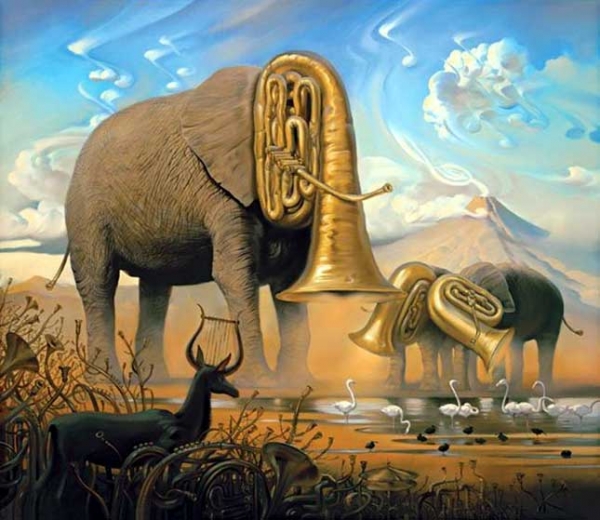Polytonalmodalyodel
for Concert Band
Composed 1990; 2004;
May 7--27, 2015; revised Dec. 2023
Duration:
about 7 minutes 30 seconds
cover: painting by Salvador Dali
Full
Score,
PDF Cover
Parts (printed front & back)
Tempo marking;
Giant leaps for all mankind [7:23]
In 1990 I wrote several works for my friend Fred Robinson who was the
composer/arranger at Warner Robins Air Force Base in Georgia. Among these was a
work for jazz band, The Popular Music of Planet X (PMPX) in three
“Books”. The idea was the rather whimsical one that somewhere among the myriad
planets there could be a civilization where the prime incentive for the music
industry was not mercenary. Clearly such a planet must be far far away.
The Air Force didn’t seem to appreciate the effort, and the score and parts
were returned. (When you bomb with the Air Force….you REALLY BOMB!)
Come summer of 2004 and I once again was writing music, and turned my attention
to the Air Force music, including the brass quintet. I made many major
alterations, added a movement, and had a brand new version. However, this work
remained unperformed. I made another version with an additional movement,
but this also sat in my files. In 2015 I decided to try again, with the last
movement (Polytonalmodalyodel) of this brass quintet arranged for
concert band, and used as the first movement of a new symphonic-scale PMPX.
In the fall of 2023, I arranged PMPX for piano quintet, and then Symphony No. 1: PMPX, with a new third movement. The
four movements of the band version of PMPX are now offered only as
separate works.
Note that this work is actually polytonal and polymodal in many places, and the
themes and motifs frequently have very large intervals, much more than my usual
tunes.
Considering that this is my personal vision of what music intended for mass
consumption would be in a more ideal world, I’ve allowed myself to allow the
influence of jazz and blues in a rather obvious manner. However, as all of my
music, this is strictly in the classical tradition, with no improvisation, and
to be treated in the same way as other “serious” art music—even, and perhaps
especially, when it’s intended to be for fun. This piece could fit on either
classical or pops concerts.
Performance Notes
The String Bass part is intended for an acoustic bass, as there are bowed
passages. An electric bass may not be used in its stead. Accidentals hold
through the measure and not beyond. This is a C score with the usual
transpositions in the parts. If a conductor requires a transposed score, I will
provide one, with considerable grumbling.




